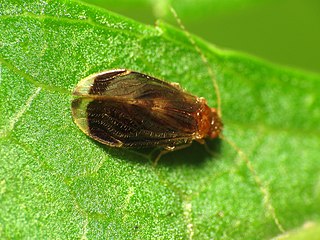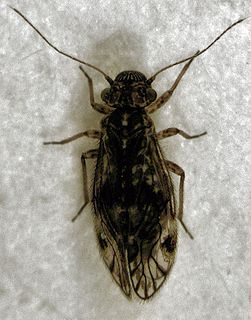
Psocomorpha is a suborder of barklice, booklice, and parasitic lice in the order Psocodea. There are more than 20 families and 5,300 described species in Psocomorpha.

Trogiomorpha is one of the three major suborders of barklice, booklice, and parasitic lice in the order Psocodea, alongside Troctomorpha and Psocomorpha. There are about 8 families and more than 430 described species in Trogiomorpha. Trogiomorpha is widely agreed to be earliest diverging of the three suborders, and retains the most primitive characteristics.

Troctomorpha is one of the three major suborders of Psocodea (barklice, booklice, and parasitic lice), alongside Psocomorpha and Trogiomorpha. There are more than 30 families and 5,800 described species in Troctomorpha. The order includes parasitic lice, which are most closely related to the booklice family Liposcelididae.

Amphipsocidae is a family of hairy-winged barklice in the order Psocodea. Most species are 3.0-4.5 mm long and have many setae (hairs) on the veins and margin of the forewing. The main veins of the forewing are usually lined with two rows of setae. Like the other members of the infra-order Caeciliusetae, they have a broad, flat labrum, with well defined edges.

Philotarsidae is a family of Psocodea belonging to the suborder Psocomorpha. The family is closely related to the family Pseudocaeciliidae, both within the infraorder Philotarsetae.
Calopsocidae is a former family of Psocodea belonging to the suborder Psocomorpha. This family is now considered to be a junior synonym of Pseudocaeciliidae.

Psocetae is an infraorder of bark lice in the order Psocodea, within the suborder Psocomorpha. It includes the families Hemipsocidae, Myopsocidae, Psilopsocidae and Psocidae.

Caeciliusetae is an infraorder of Psocodea in the suborder Psocomorpha. There are about 6 families and more than 1,300 described species in Caeciliusetae.

Peripsocidae is a family of Psocodea belonging to the suborder Psocomorpha. Members of the family are characterised by their absence of an areola postica in their wings. Many of the recently described genera are closely allied to Peripsocus. The family includes more than 300 species.

Lachesillidae is a family of Psocodea belonging to the suborder Psocomorpha. Members of the family are characterized by a rounded, free areola postica in their wings. Males have diverse sclerotized genitalic structures. The family includes more than 400 species, most of them in the genus Lachesilla.
Bryopsocidae a former family of Psocodea belonging to the suborder Psocomorpha. This family is now considered to be a junior synonym of the subfamily Zelandopsocinae within the family Pseudocaeciliidae.

Caeciliusidae is a family of Psocodea belonging to the suborder Psocomorpha. The family was once named Caeciliidae, but the latter name was changed because of homonymy with the amphibian family Caeciliidae. The subfamily Paracaeciliinae was formerly in Caeciliusidae, but it has been elevated to family rank, Paracaeciliidae.
Mesopsocidae is a family of Psocodea belonging to the suborder Psocomorpha. Members of the family are characterized by their free areola postica. The family includes more than 70 species.

Homilopscocidea is an infraorder of Psocodea. It is probably a paraphyletic group, still in use for lack of a better solution. There are about 7 families and more than 1,200 described species in Homilopsocidea.

Stenopsocidae is a family of Psocoptera belonging to the suborder Psocomorpha, in the infraorder Caeciliusetae. Member of this family have an areola postica connected to the M vein by a crossvein. The family is composed of about 100 species.

Psocodea is a taxonomic group of insects comprising the bark lice, book lice and parasitic lice. It was formerly considered a superorder, but is now generally considered by entomologists as an order. Despite the greatly differing appearance of parasitic lice (Phthiraptera), they are believed to have evolved from within the former order Psocoptera, which contained the bark lice and book lice, now found to be paraphyletic. These insects first appeared in the Permian period, 295–248 million years ago. They are often regarded as the most primitive of the hemipteroids. Psocodea contains around 11,000 species, divided among four suborders and more than 70 families. They range in size from 1–10 millimetres (0.04–0.4 in) in length.

Epipsocetae is an infraorder of psocids in the order Psocodea. There are about 5 families and more than 480 described species in Epipsocetae.

Psocinae is a subfamily of common barklice in the family Psocidae. There are about 11 genera and at least 40 described species in Psocinae.

Paracaeciliidae is a family of bark lice in the order Psocodea. There are about 5 genera and more than 100 described species in Paracaeciliidae.
Spurostigmatidae is a family of lice in the order Psocodea. There is at least one genus, Spurostigma, in Spurostigmatidae.














